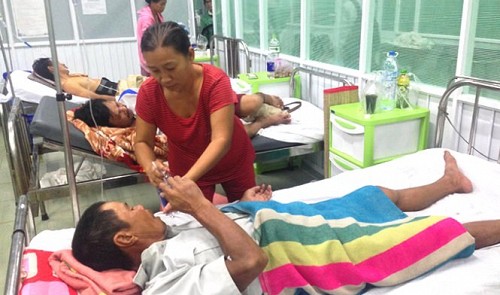Editor's note: Stivi Cooke is an Australian having lived in Hoi An, located in central Vietnam, for years.
With the horror of the Paris terror attacks, the Beirut bombings and other terrible events leaving us reeling over recent days, I had a powerful reminder of the value of family and community.
For an expat living alone or with few strong connections to the local Vietnamese communities, life becomes more fragile and risky when things go wrong. It probably doesn’t get much worse than a medical emergency visit to a local hospital. If you’re used to a world-class medical system such as I have back in Australia, the realities of the Vietnamese health system can be a big shock to a foreigner.
Hospitals in Vietnam service a big population scattered far and wide, are chronically under-resourced and with training and equipment that lag far behind Western standards in many places. Emergency rooms are often overflowing and staffing is always a problem. Relatives often have to camp, literally on the front doors to attend to their loved ones’ needs – bathing, food and the all-important psychological aspects of knowing someone is there.
Visiting my friend who’s recovering from a serious problem in an intensive care unit (ICU) recently has been daunting as dozens lie in neighboring beds in all manners of pain and distress without screens or curtains for privacy. It’s also a reality that some patients admitted to the ICU can’t be saved and fade away before intervention can make a difference. It’s a confronting smear on our comfortable view of life.
The ward my friend is in is fortunately equipped with modern emergency equipment, trained staff and a high level of monitoring. It’s to the credit of the staff working in overloaded conditions, with the unwanted pressures of relatives coming and going, performing daily routines while being constantly interrupted. They do their jobs with a level of strength, cheerfulness and diligence, which I thought was amazing. You’ve got to be tough to work in a hospital!
It’s such a far cry from the orderly, calm operations of the Australian system. However I was surprised at the lack of queue-jumping and ‘me first’ attitude that you frequently find elsewhere in Vietnam. The locals are remarkably compliant.
It’s in environments such as these that the true quality and value of Vietnamese togetherness shine in the face of serious illness, stress and situations out of their control.
Hundreds of Vietnamese rolled through the gates hour after hour while I was there carrying bags and bags of food and drink for other waiting relatives and stuff for their patients. Relatives clearly take a load off the nurses helping with basic routines; washing, feeding, changing clothes etc. To watch families gently soothing their tired and dazed relatives while feeding is an act of love far beyond words.
As I sit writing this outside in that gorgeous half pink, purple sunset that Vietnam does so well on a clear evening – I look across the grounds to the relatives chatting, consoling and supporting each other. Nothing short of an earthquake would move them away.
Sitting on dozens of mats with none of the real comforts of home, willing to go through their own discomfort for the sake of looking after others; I couldn’t stop admiring the power of family and community – families sharing food with strangers, sitting quietly together when they’ve run out of things to talk about or even the simple things – holding doors open for others, moving aside for other people to have a turn to talk to the nurses.
Hour after hour more victims arrived, some frantically being carried by sprinting relatives, others lucky enough to have found a trolley to be wheeled in, looking half dead as they ploughed their way through the crowds. I didn’t hear or see a single person complain about being pushed out of the way or having to wait, sometimes for hours, to gain access to their sick relatives.
When we are stripped of our independence and our ability to look after ourselves, nothing shows us more clearly the qualities of those around, regardless of whether you like or hate them, than the willingness to pull together in a common call to help in the face of adversity.
For my friend, many who know him have rallied around to help in whatever way they can. Visiting, organizing, raising money, contacting others, checking his other world: house and possessions – it’s a big list, and a credit to our small expat community! He has finally been evacuated to Sydney, Australia. It’s great news although we shouldn’t forget the plight of local patients whose need for support is ongoing.
For the locals and expats alike, one truth holds stronger than anything else... For all the troubles in the world or in our personal lives, we can be thankful for the one thing that can never be destroyed, killed or defeated: the power of family and community.






















































